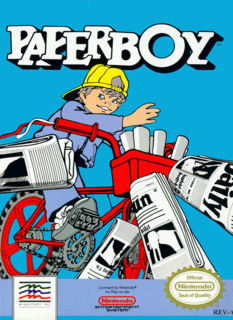Saving the land from TV journalism...
The aim of Paperboy is to maintain a newspaper based protection racket, delivering to those who've subscribed and vandalising the property of those who haven't. The original arcade machine sported an impressive yet magnificently impractical steering wheel controller. Aside from the more conventional controls and a few updates, this is Paperboy in all its frustrating, paper flinging glory.
Given that walking calmly up a garden path and carefully sliding a newspaper through a letterbox isn't hugely exciting, Paperboy adheres whole heartedly to the film stereotype; papers are delivered long range, at high speed, and on two wheels. It's not enough just to drop papers onto the doormat of subscribers; those too foolish to sign up for the daily delivery must be shown the error of their ways. Quite clearly, the best way to convince someone to buy a newspaper is to throw several free copies through their window, or use an issue to break their bird bath. Hell, you can dispense with the papers all together and just pedal through their flowerbeds. From the porch lights to the downright worrying tombstones sat in the front gardens of some houses; if it can be broken, cracked or knocked over, it's a fair target.
Of course the residents of along the route won't stand idly by while their windows are popped in. In a spectacular display of community spirit, all of suburbia has gotten together behind a common goal: knocking the paper boy from his bike. Each street is packed with obstacles and hazards, ranging from the expected (small, irritating, yappity dogs) to the ridiculous (The Grim Reaper himself will try to poke his scythe into the spokes of your BMX) via blondes in jalopies, hearses, panther sized house cats, remote control cars, break dancers, sentient lawnmowers, and two bald men fighting (potentially over a comb). Every single man, woman, child, animal, and anthropomorphic personification of death is out on the street with the express purpose of ruining your day. And that makes delivering papers just a little bit difficult.
Describing Paperboy as 'slightly difficult' is roughly equivalent to saying that poking an angry bear in the eye is 'a touch dangerous'. Even on its easiest difficulty setting, the hilariously inaccurately titled Easy Street, the game mercilessly throws hazard after hazard your way. Just getting from to the end of the street can be a daunting task hitting any kind of obstacle, from ambling rummy to picket fence takes one of the paperboy's three lives. Unlike most arcade machines, you couldn't 'insert coin to continue'. Once those three lives are gone, the splendid game over screen detailing your ineptitude in printed form pops up and you have to start all over again. Just getting from one end of the street to another requires a lot of memorisation; factor in trying to accurately aim as a possessed tyre chases you along the pavement and you have a game that will inspire you to invent new swear words once you've exhausted the old favourites. Paperboy's difficulty is a product of it's time; arcade machines in the eighties (and early nineties) were designed to suck money from patron's pockets.
Unlike some Live Arcade releases, Paperboy's graphics and sound have been left untouched. There are a handful of options for resizing the screen but, those aside, Paperboy looks and sounds just like it did in 1984. The game hasn't aged gracefully and while it's not an ugly game by any means, redrawing the graphics and updating the sound would have been a nice touch
While Digital Eclipse didn't update the game's presentation, they did throw in some online features, in the shape of leader boards and multiplayer modes. The multiplayer is split into versus and coop mode but both work the same way. There's no actual interaction; both players play the game as normal, but your opponent's score and remaining lives will appear in a corner. The multiplayer modes aren't particularly satisfying and given that Paperboy is an inherently solo game, the inclusion is slightly puzzling. The online leader boards are a far more meaningful addition. Paperboy is intrinsically a score based game; the leader boards add a touch more depth to the game as you try and squeeze a few more points out of each delivery.
Ultimately Paperboy's worth is determined by how fondly you remember the arcade machine. If you loved Paperboy in the eighties, you'll likely still love it now. If the game passed you by, its nightmarish difficulty and dated presentation will probably outweigh its charms. Paperboy is an arcade classic and the perfect embodiment of the phrase 'just one more ', but the stiff learning curve and repetitive action will put off those unfamiliar with the game. Nostalgia will sell Paperboy but even the uninitiated should take the bike out for a spin, if only to see how blatant arcade game manufacturers were in their attempts to get people shovelling money into the machines.

